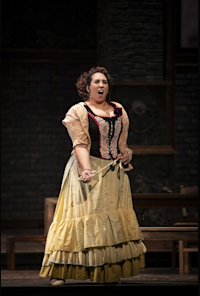When, at the beginning of 1873, Georges Bizet was commissioned by the director of the Paris Opéra-Comique, Camille du Locle, to write the opera Carmen, Mérimée's novella of the same name, after which Henri Meilhac and Ludovic Halévy wrote the opera libretto, had been stirring the French for almost three decades , especially Parisian society. The content of the novella is supposed to be derived from a true story, which was entrusted to Mérimée during his study trip to Spain by Countess María Manuela Kirkpatrick de Montijo. Mérimée condensed the most exciting events from the life of the gypsy Carmen into a coherent narrative with the tragic end of the (anti)heroine, who had to die because of the vengeful jealousy of a rejected lover (Don José). As an interesting fact that confirms the authenticity of the opera plot, it is also worth mentioning the preserved travelogue of Mérimée, in which the writer mentioned his chance meeting with Carmen and later also with José, who in the meantime was already serving a prison sentence awaiting a death sentence. José's testimony about his fateful meeting with Carmen is also preserved in Mérimée's novella, which was first published in its entirety in book form in 1846.
Bizet's strong address to naturalism as extreme realism is reflected in the belief that the libretto must reflect the "truth of the street" or become a faithful witness of what really happened, which is especially true of the phenomenon of "unpleasant truth". Taking into account Bizet's instructions, the librettists Meilhac and Halévy mostly followed Mérimée's narrative flow, but for the needs of a clearer stage (re)presentation, they somewhat rationalized it and focused on the love relationship between Carmen and Don José, while eliminating some non-essential characters. As José's opponent, both librettists set only the bullfighter (toreador) Escamillo, and the kind-hearted and naive middle-class girl Micaëla as Carmen's "decent" female antipode. The radical and partly shocking content of the opera,
With the opera Carmen, which was performed for the first time on March 3, 1875 at the Opéri-Comique in Paris, Bizet undoubtedly created a new musical atmosphere, orchestral color, onomatopoeic musical naturalism of the south of Spain, and reached his last artistic peak, which he should be understood as a reliable turn towards operatic verism. The multifaceted musical topos and far-reaching nature of Bizet's Carmen were admired by a whole range of composers and philosophers, including Tchaikovsky and Nietzsche. The latter in particular admired the "dramatic mastery" in Bizet's score, which still does not have its "established" final image today - which can be attributed mainly to the added recitatives, which in the productions after the premiere replaced the stage speech, otherwise typical of the genre of French opéra comique -.








